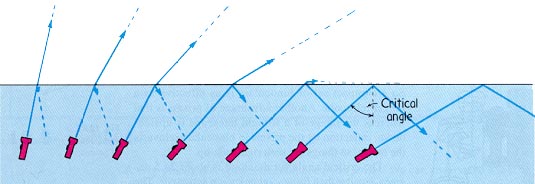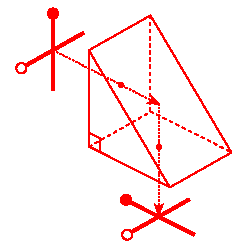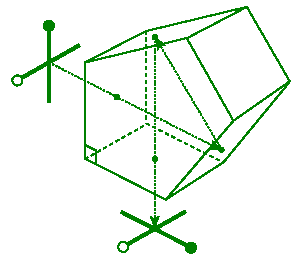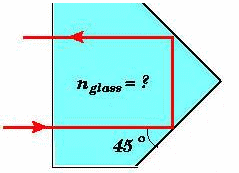
Please watch this short Youtube video clip.
When light propagates from air into glass or from glass in to air it may
change its direction of travel. Snell's law reveals the relationship between the
directions of travel in the two media.
n1sinθ1 = n2sinθ2.
Consider light propagating in glass with index of refraction n1 =
1.5 towards a glass-air boundary. If the angle the light makes with the normal
to the boundary in the glass is θ1, then
the angle it makes in the air is given by
sinθ2 = (n1/n2)sinθ1
= 1.5 sinθ1.
If sinθ1 > (1/1.5) = 2/3, or
θ1 > 41.8o, then sinθ2
is greater than 1 and there is no solution for θ2.
The angle θ1 for which sinθ2
= 1 is called the critical angle θc. We
have sinθc
= n2/n1.
For angles
θ1 greater than the critical angle there
exists no solution for θ2, and there is no
refracted ray.
The incident light is totally reflected, obeying the law of
reflection. If n2 = 1.5 and n1 = 1 then the critical angle
is θc = 41.8o
Total internal reflection occurs only if light travels from a medium of high index of refraction to a medium of low index of refraction.
Summary: Let light travel from medium 1 into medium 2
and let n1 > n2.
Then the critical angle θc is given by sinθc = n2/n1.
For angles greater than the critical angle the incident light is totally
reflected, obeying the law of reflection.

A light source is at the bottom of a pool of water (n = 1.33). At what minimum angle of incidence will a ray be totally reflected at the surface?
Solution:
Light enters through the side of a water-filled aquarium. It is internally reflected at the critical angle θc at the top surface. What is θi in terms of θc and nwater?

Discuss this with your fellow students in the discussion forum!
Snell's law also applies to the ray entering the aquarium.
An ordinary glass mirror consists of a reflective metallic coating on the back of a sheet of glass. This is not the only way to make a mirror. Total internal reflection can be exploited to make a perfectly reflecting mirror using only glass, with no metal backing. It is possible to use prisms of various shapes to reorient images.
Right-Angle Prism
The prism is used like a
mirror. If the refractive index of the prism is large enough, we
obtain Total Internal Reflection (TIR) and the prism acts like a
mirror of 100% reflectance.
How large must the refractive index be?
We want the critical angle θc
to be smaller than 45 degrees. Since for a glass prism in
air sinθc = 1/n, we need n > 1/sin(45o) or n >
√2
= 1.414.

Dove Prism
This prism is used to "flip" an image without reorienting the optical axis.

Penta Prism
Like the Right-Angle Prism, this prism reorients the optical axis by 90o. However, the Penta Prism does not flip the image. Penta Prisms are used in 35-mm Single-Lens-Reflex (SLR) cameras to produce an upright image in the viewfinder.

 Problem:
Problem:Assume you are using total internal reflection to make a corner reflector. If there is air outside and the incident angle is 45.0o, what must be the minimum index of refraction of the material from which the reflector is made?
Solution:
Additional information: The Physics Classroom: Refraction and the Ray Model of Light Lessons 3